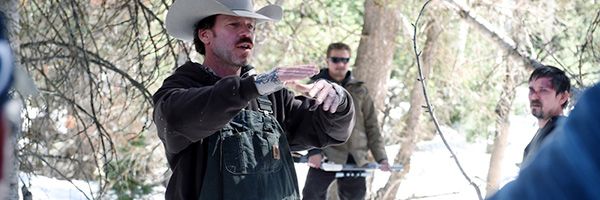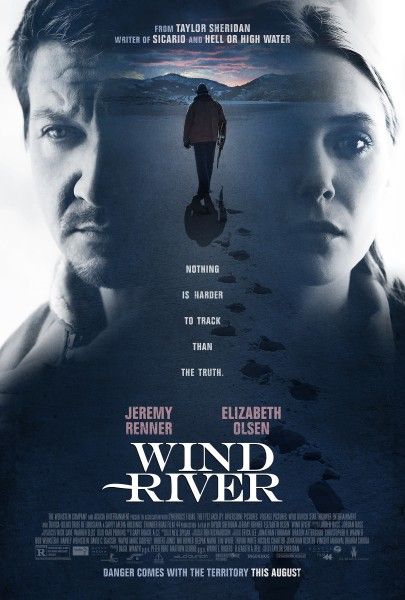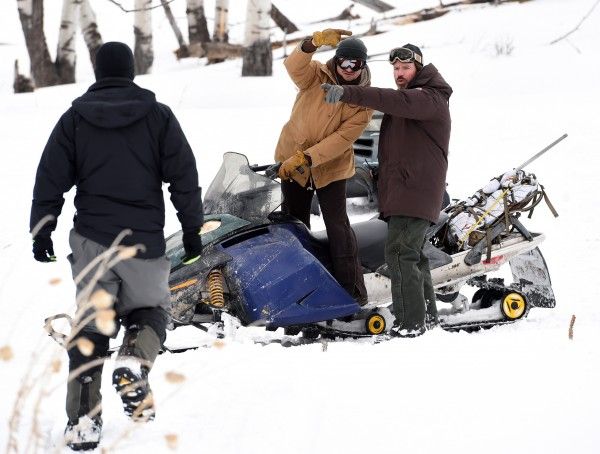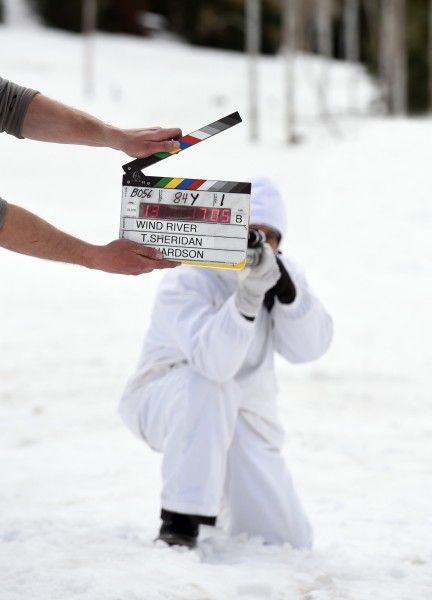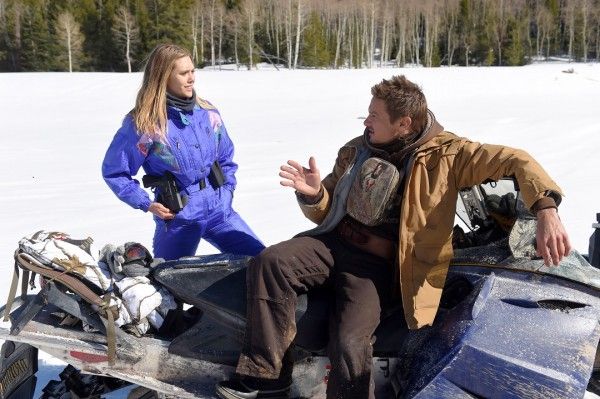Last week I got to talk to Taylor Sheridan for his new film Wind River. The film marks directorial debut of the Oscar-nominated screenwriter (Hell or High Water) and follows a wildlife officer (Jeremy Renner) teaming up with an FBI agent (Elizabeth Olsen) to investigate a murder on a Native American reservation. It’s a powerful conclusion to Sheridan’s “frontier trilogy”, and I definitely recommend checking it out when it comes to a theater near you. Click here for my full review from Sundance.
During my conversation with Sheridan, we talked about how the frontier trilogy (which also includes Sicario and Hell or High Water) ties together thematically, if there’s a particular order to watch them in, what he learned about Native American reservations from his time living on one, and much more. We also talked about his script for the upcoming Sicario sequel Soldado and how he’s planning to tackle a TV series by writing and directing all the episodes for Yellowstone.
Check out the full interview below. Wind River is now in limited release.
What made you want to go with Wind River as sort of your directorial debut?
TAYLOR SHERIDAN: I mean, it's not that I wanted to. It's that I was ... With this specific subject matter I was very worried that, you know, someone else would have a different vision for it and slight alterations to very specific things in here would alter the course of what I was trying to convey, and, you know, in order to write this story I had to ... I had given my word to some people in Indian country, you know, it took a lot of trust to let me tell the story and I just couldn't run the risk of someone altering that vision.
Is that something that you've sort of run into in the past where, you know, you went in with the script and there were just a lot of changes to it?
SHERIDAN: No. I've been very lucky, especially with the original screenplays I've written. You know, when you write an original piece by yourself, you know, with no one attached yet and then you being attaching be it a Director, or Producers, and then start piecing it together, everyone is really coming aboard, you know, to create the world that you imagined as opposed to an assignment where you're writing essentially for a Director or a studio, where you know they're going to want their opinion heard, and with a Director certainly rightfully so. But it's distinct when it's an original piece. But still, everyone is going to have, you know, it's going through a filter and it's a different filter and so, you know, I've been very lucky with Sicario and Hell or High Water but I just didn't, I couldn't trust I would get that lucky a third time. And it was a natural evolution. I wanted to tell the story a really specific way and directing it's the only way to make sure that happens.
You’ve kind of referred to Sicario and Hell or High Water and now Wind River as kind of a “frontier trilogy.”
SHERIDAN: Yes.
Do you feel like this is a trilogy that should be watched in the order that they were released, or is it just something where these three films are a piece?
SHERIDAN: Well, I mean, I think that, you know, if one were to watch them in order then they're going to see similarities beyond just the frontier. They're going to see similarities in how, you know, these three ... If you think about it, it's three fathers, each facing a failure of whether that failure was innocence or naiveté about I believe for the rule of law with Alejandro, whether it's, you know, with Toby in Hell or High Water, that failure is an inability to provide and so he makes a decision to, you know, operate outside the rule of law in this sort of selfish martyrdom. And with Cory, his failure is trusting his child where he lives in a place where the rule of law doesn't exist. So there are absolutely themes that I think, you know, watched in conjunction, questions raised in Sicario that are answered in Wind River. I think that it hopefully is an interesting experience in the aggregate but they also all stand alone.
One of the things that I love about these three films is that they feel like modern day Westerns and I'm a huge fan of the Western genre and I was kind of curious about your thoughts about trying to take that genre and put it in the present day.
SHERIDAN: Yeah. I mean, it's, you know, the location itself does it and then various themes of the Western, of taking justice into your own hands, making the traveling from point A to point B not a foregone conclusion and to give some real rigor to that journey. If you think about it, in most traditional Westerns you're going to see, you know, the heroes or the villains ride up over the plains and move into this place and in these movies, you know, I'm doing it as well but I'm doing it in vehicles or helicopters or snowmobiles. I'm using, you know, this iron horse, so to speak.
Well what's also fascinating is that you've also sort of like come across to confront the notions of civilization, like how each sort of film is wrestling with how civilized do we think we are?
SHERIDAN: A hundred percent, and also how has the construct of that civilization failed the people it governs? But in all three of them there is this element of how much have we truly evolved and the very nature of violence in man and how tethered to it we are. You know, you would think at this point with ... I can't come up with a reason that we are so, as a species ... and every species is violent. Violence is literally the glue of the cycle of life and yet I think that we're the only species that does it maliciously.
One of the other fascinating things about Wind River is it really sort of paints a vivid portrait of sort of the divisions between the American side and the Indian reservation and I was curious about just sort of your research in trying to get that as accurate as possible.
SHERIDAN: Well I spent a lot of time on the Res when I was younger, in my 20s and 30s, and so I witnessed it. I witnessed the real failure of the government, you know, to provide and protect and deliver the things that it had promised it would deliver when it consigned people to live in very specific areas and then ignore, which is sort of the policy, every promise that had been made, repeatedly, and the consequences are so ... Because the area's so isolated, the consequences seem to land harder. The bombs seem to have more concussion.
Everyone that lives on the Res is suffering the same thing. Now each family may have its own unique issues or triumphs but when the government changes the policy, or de-funds this program, it affects virtually everyone when a policy is changed or tweaked or altered. In urban Los Angeles the effect is sort of scattered. It's not as ... you know, it's almost as though you don't see it, it doesn't mean the suffering isn't present but it's absorbed by the fact that there's people peppered throughout that aren't suffering but there, when a change is made, the consequences affect everyone when the decision is made to frack reservation land, the water is ruined for everyone, you know.
When policies such as the inability for anyone to prosecute a non-Native member for committing a sexual assault against a Native member on a reservation, that is a complete consequence for everyone. That law four years ago changed but until four years ago, that was the case.
The film does like a really good job of visually capturing sort of that sort of distance and sort of being close up and confined. Like you will have like sort of these scenes where they dwarf the characters, the scenery does, and then you will be you know confined in a trailer and like you can't really escape it. And that was a really interesting visual language to use.
SHERIDAN: Yeah. You know, there's a sense of ... there's such a vastness to specifically this Res and to this region, and I really wanted to give not only a sense of how massive this landscape is but how small and inconsequential we can be within it. And so you know, I've ... Ben and I, Ben Richardson, my DP, we relied you know really heavily on extreme wide angle lenses which is not that common anymore and we were very, very selective about when we came in super close. Likewise, we, you know, the trailer that we shot, the Sam Little Feather trailer, these were actual trailers.
Traditionally what you would do is is build one on stage and cut it in half so you get some room to move around but I wanted it to feel that confining. I wanted to feel like you were in this, you know, this cave, this little box. And so we worked within the real ones, the practical, you know, a traditional worker's trailer or a single, wide, which made for difficult shooting but it also made it feel real, I think.
So you also wrote the Sicario sequel, Soldado. Correct?
SHERIDAN: Yes.
Do you see that as a continuation of these frontier films or do you feel like that series is going in a different direction now?
SHERIDAN: No. That thing has evolved into something completely different and, you know, I've seen an early version of it and I'm really encouraged, but it's ... that thing goes off on its own. If you're going to make a sequel to Sicario, you have to, you know, you've got to go beat a brand new path.
Do you feel that the story of Sicario, now that it's continuing in Soldado, that there could be future films that continue to build that story forward?
SHERIDAN: I would like there to be one more to complete that so all of a sudden I don't know what geometric shape you'd call this that you have a trilogy kicking off from a trilogy, and this one not being thematic, this one being actual, you know, it's a really unique opportunity to capitalize on something purely creatively. You know what I mean? It's a really bizarre thing to franchise, if that's the right word, which I don't think it is. You know, Sicario was successful but it was successful because Denis and the producers were, you know, they were very lean. It was very lean filmmaking. And so it didn't, by comparison to films that look like that, didn't cost very much money and so likewise with the sequel, that didn't cost much more which allows us to stay really true as opposed to trying to reach a broader audience, make a richer experience for that audience and hopefully bring in more but that's not necessarily the goal. The goal is to continue down this story, you know.
When I told them I would write it, they asked for the traditional studio call and the outline and all that, and I said, "No, no, no, guys. The first one was original. I'm just going to go away and I'm going to come back with it and there you go." And they trusted me to do that, and then read it and were like, "Ah, shit. We're in a lot of trouble." It makes the first one look like a comedy. Yeah. I'm not the guy to ask to write a sequel.
I'm very much looking forward to it. You're working on a TV series, Yellowstone, correct?
SHERIDAN: Correct. Yes.
Can you talk a little bit about that and like what you're sort of going for in that sort of move to television?
SHERIDAN: Well the interesting thing about it is because you ... you know, I can look at the world over a longer period of time and it's not a, you know, I'm not trying to open a door and then close it in a two-hour window. I can open a door and leave it open for three years so it really becomes a true examination of a world and it's something that I think is, you know, I wanted to create something that feels really fresh and yet has the kind of grandeur some of those TV shows like Bonanza and Green Valley and these shows of yesteryear and yet look at it through a lens of today. You know, I like to describe Yellowstone is The Great Gatsby on the largest ranch in Montana. Then it's really a study of the changing of the West.
Is this a series that like you'll be like leading the writers room? Do you want to direct a lot of the episodes? Do you have like an outline for that?
SHERIDAN: Well, you know, it's funny you should say that. When Paramount came across the script and asked if I wanted to do it and they wanted to go this fall ... and this was in May and I was like, well it's not possible and I have no interest in that. I said I'll do it if I can get Kevin Costner to play the lead, but he's not going to do that, but I'll ask him. And then I asked him and he said, "Yes," and I'm like, "Great. What do I do now?" So there is no writers' room. I wrote them all and I'm directing them all.

